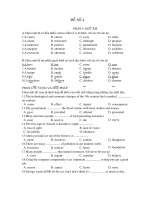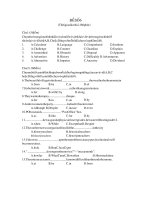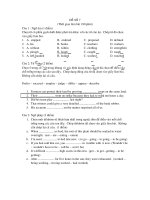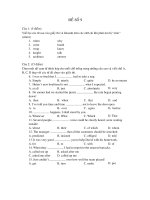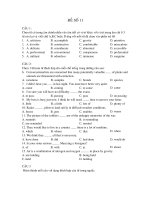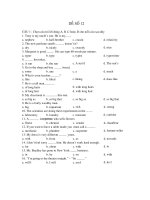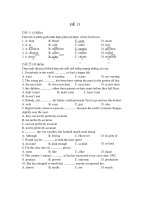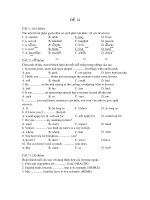đề thi thử đại học môn anh văn - đề số 5
Bạn đang xem bản rút gọn của tài liệu. Xem và tải ngay bản đầy đủ của tài liệu tại đây (36.27 KB, 9 trang )
ĐỀ SỐ 5
Thời gian làm bài : 90 phút – số câu trắc nghiệm : 70
Đọc kỹ bài khóa sau và chọn phướng án đúng ( ứng với A hoặc B, C , D ) cho các câu từ 1
đến 5
The agricultural revolution in the nineteenth century involved two things: the
invention of labour – saving machinery and the development of scientific agriculture.
Labour – saving machinery naturally appeared first where labour was scarce. “ In
Europe,” said Thomas Jefferson, “ the object is to make the most of their land, labour
being abundant; here it is to make the most of our labour, land being abundant. “ it was in
America, therefore, that the great advances in nineteen-century agricultural machinery
first came.
At the opening of the century , with the exception of a crude plow, farmers could
have carried practically all of the existing agricultural implements on their backs; by
1860, most of the machinery in use today had been design in an early form. The most
important of the early inventions was the iron plow. As early as 1790 Charles New bold of
New jersey had been working on the idea of a cast-iron plow and spent his entire fortune
in introducing his invention. The farmers however, would have none of it, claiming that
the iron poisoned the soil and made the weeds grow. Nevertheless, many people devoted
their, attention to the plow, until in 1869 James Oliver of South Bend, Indiana, turned out
the first chilled-steel plow
1. Which of the following best expresses the main topic of the passage?
A. Machinery that contributed to the agricultural revolution
B. The development of safer machines demanded by the labor movement
C. New Jersey as a leader in the agricultural revolution
D. The need for agricultural advances to help feed a growing population
2. Which of the following can be inferred from what Thomas Jefferson said ?
A. Europe had greater need of farm machinery than America did
B. Europe was changing more quickly than America
C. America was finally running out of good farmland
D. There was a shortage of workers on American farms
3. The expression “make the most of “ in the passage is closest in meaning to
which of the following?
A. Raise the price of
B. Overuse the real worth of
C. Earn a living on
D. Get the best yield from
4. What point is the author making by stating that farmers could carry nearly all
their tools on their backs?
A. Farmers had few tools before the agricultural revolution
B. American were traditionally self- reliant
C. Life on the farm was extremely difficult
D. New tools were designed to be portable.
5. Why did farmers reject Newbold’s plow?
A. They thought it would run the land
B. Their horses were frightened by it
C. They preferred lighter tools
D. It was too expensive
Chọn phướng án ( A hoặc B,C,D) ứng với từ/cụm từ có gạch chân cần phải sửa để các câu
sau trở thành câu đúng.
6.(A) when a (B) little boy , he (C) is used to go swimming (D) in the river with me
7. (A) In general, newspapers emphasize (B) current news (C) whereas
magazines (D) dealt more with background materials.
8. Peter never (A) go to bed (B) before he (C) has finished (D) his homework
9. Hoa (A) writing (B) a letter in (C) her room (D) at the moment
10. We were (A) surprising (B) by the results (C) of the (D) test.
11. Mr. Miller (A) doesn’t (B) likes (C) being kept (D) waiting
12. An (A) spent (B) many money (C) on clothes (D) at the supermarket
yesterday
13. There (A) is a hostel (B) at the corner (C) of this street where we (D) can
stay there
14. I (A) haven’t (B) smoked (C) since a (D) long time
15. I (A) don’t think I can get (B) the job (C) because there are many (D)
applicant for it
Chọn phương án đúng ( ứng với A hoặc B,C,D) để hoàn thành mỗi câu sau:
16. This tool is dangerous……………………………it is used carefully
A. Unless
B. Or
C. Whether
D. If
17. When the storm ……………………………this area tomorrow, it will bring with it great
destructive force.
A. Is reaching
B. Will reach
C. Reaches
D. Is going to reach
18. Most children fell …………………………… on the New Year’s Eve
A. Excite
B. Exciting
C. Excitement
D. Excited
19. ……………………………my students are familiar with this kind of activities
A. Most
B. A few
C. Few
D. Most of
20. Don’t spend your money …………………………… Save it !
A. Wastefully
B. To waste
C. Waste
D. Wasteful
21. I don’t know what you think about George’s work, but in my …………………………… it’s
very good
A. Opinion
B. Feeling
C. Thought
D. Idea
22. there are a lot of people …………………………… London everyday
A. have visited
B. visit
C. visiting
D. to visit
23. Most of the goods …………………………… in this factory are exported
A. Make
B. Making
C. To make
D. Made
24. We can’t have out car now ; ……………………………at the garage
A. It’s still being repaired
B. It’s still repairing
C. It’s still repaired
D. It’s still being repairing
25. The more waste paper we recycle……………………………
A. The least tress we preserve
B. The most trees we preserve
C. The more tress we preserve
D. The best tress we preserve
26. The building used to be a library……………………………
A. Isn’t
B. Doesn’t
C. Didn’t
D. Wasn’t
27. We have no money …………………………… Tom has some
A. So
B. Either
C. But
D. Or
28. John …………………………… you when he has finished the report
A. Called
B. Calls
C. Will called
D. Has called
29. Our village had …………………………… money available for education that the schools
had to close
A. So little
B. So many
C. So few
D. So much
30. She practices playing the piano …………………………… than I do
A. More regularly
B. Most regularly
C. As regularly
D. Quite regularly
31. They left the room …………………………… they had finished the example
A. During
B. While
C. Soon
D. As soon as
32. When I returned, I found that my car …………………………… away
A. Had been towing
B. Has been towing
C. Has been towed
D. Had been towed
33. The government…………………………… the earth quake victims with food, clothes and
medicine.
A. Gave
B. Offered
C. Carried
D. Provided
34. …………………………… with the picture, Mary tore it to pieces
A. To be thoroughly dissatisfied
B. Dissatisfying thoroughly
C. Being thoroughly dissatisfied
D. To satisfy thoroughly
35. I was responsible to my mother …………………………… looking after out pets while she
was at work
A. Because
B. With
C. For
D. Of
36. He …………………………… for the exams at the moment. I don’t think he can join us in
our picnic
A. Studies
B. Will study
C. Is studying
D. Has studied
37. I …………………………… sport to keep fit , not because I like it
A. Train
B. Make
C. Do
D. Practice
38. we spoke quietly……………………………disturb anyone
A. in order that we
B. not in order to
C. so that we would
D. so as not to
39. This device is ……………………………grinding meat
A. To
B. For
C. On
D. In
40. My parents always let me …………………………… what I think I should
A. Doing
B. Do
C. To do
D. For doing
41. I remember …………………………… to the zoo before
A. Taking
B. Be taking
C. Being taken
D. To take
42. if I see David, I’ll invite him …………………………… dinner
A. to

